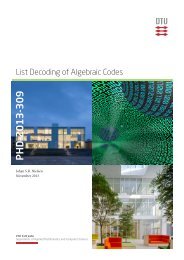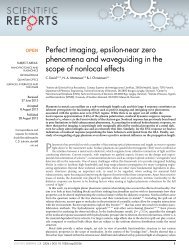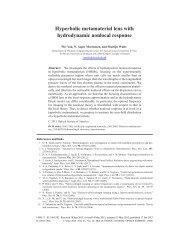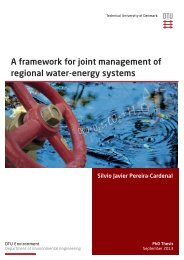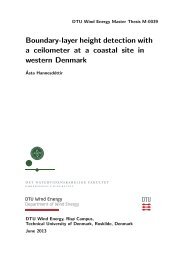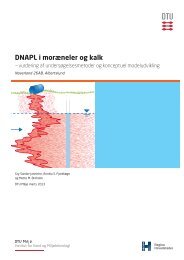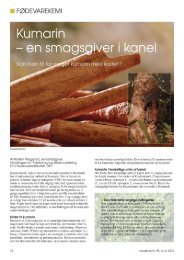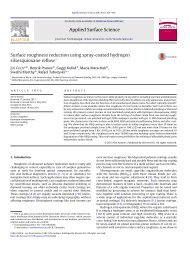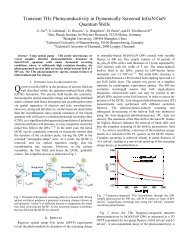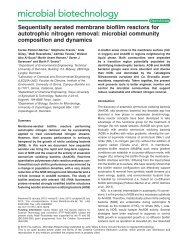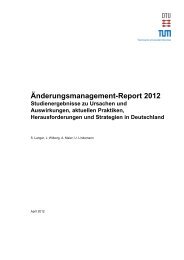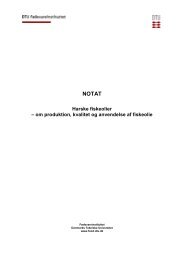PEC12-25 CAPEC-PROCESS Industrial Consortium ... - DTU Orbit
PEC12-25 CAPEC-PROCESS Industrial Consortium ... - DTU Orbit
PEC12-25 CAPEC-PROCESS Industrial Consortium ... - DTU Orbit
Create successful ePaper yourself
Turn your PDF publications into a flip-book with our unique Google optimized e-Paper software.
• In the pharmaceutical sector several projects (BIONEXGEN, ENG-BIO, AMBIOCAS<br />
and BIOTRANS) sustain the development of the next generation of enzyme based<br />
methods for the synthesis of optically pure molecules. These EC-funded projects are<br />
with many industrial and academic partners. The Center is also involved in a 5-year<br />
project with Lundbeck aiming at moving from batch towards continuous production,<br />
Specifically on the development of microbioreactors, <strong>PROCESS</strong> has initiated a project<br />
of the Free Research Council – Technology and Production Sciences (FTP) (Novel<br />
greener and lean processes using integrated microfactories).<br />
• A new FP7 project (BIOINTENSE) is in the negotiation phase to start in mid 2012<br />
focused on microscale approached to the rapid development of biocatalytic processes.<br />
<strong>PROCESS</strong> are the project coordinators.<br />
• <strong>PROCESS</strong> has joined the SANITAS project, an EC-funded project (ITN) with focus on<br />
the development of the next generation of modelling and simulation tools for<br />
performance evaluation of wastewater treatment plants.<br />
The vision of the Center for Process Engineering and Technology is to provide the<br />
necessary support to enable the next-generation of processes to be implemented in industry.<br />
In this way the new developments in biotechnology, catalysis and separation science<br />
alongside process engineering can be translated into industrial practice. New processes with<br />
reduced waste, high efficiency and based on all the principles of sustainability can be<br />
developed which will help develop the European industrial sector in the production of<br />
chemicals, bio-based materials and chemicals, as well as pharmaceuticals.<br />
1.3 <strong>CAPEC</strong>-<strong>PROCESS</strong> Activities<br />
While maintaining their unique center activities, it has been decided to join forces on a set<br />
of research topics of mutual interest within the pharmaceutical, agrochemical and bio &<br />
food industrial sectors. The interaction between the <strong>CAPEC</strong> and <strong>PROCESS</strong> centers at the<br />
level of the industrial consortium is illustrated through Figure 1.2. For the industrial<br />
consortium, the <strong>CAPEC</strong>-<strong>PROCESS</strong> collaboration should result in increased dataknowledge<br />
on chemicals based products and their processes, design of the product-process,<br />
control-monitoring of the product-process, and, development of more sustainable and<br />
“greener” products-processes. The two centers tackle these problems from two different<br />
approaches: <strong>CAPEC</strong> employs a model-based systems approach that also leads to computeraided<br />
tools, while, <strong>PROCESS</strong> employs a systematic experiment/data based process<br />
understanding to perform the necessary process analysis and evaluation. The <strong>CAPEC</strong>-<br />
<strong>PROCESS</strong> collaboration therefore is able to generate methods and tools that are not only<br />
able to provide new innovative product-process designs but can also provide fundamental<br />
understanding, analysis and evaluation of the design problem. This is essential for future<br />
implementation of these processes in industry.<br />
10



